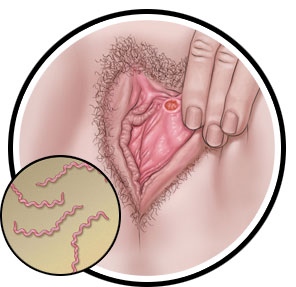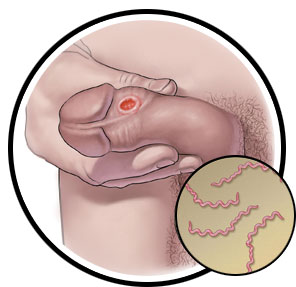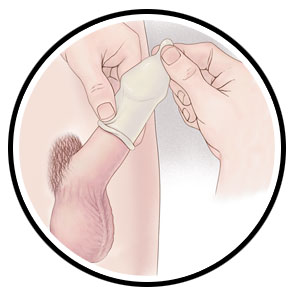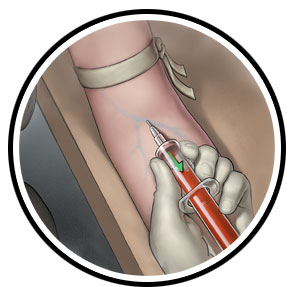What you should know
Risks for transmission
- Syphilis is a bacterial infection that can be transmitted through unprotected oral, vaginal or anal sex with an infected partner, including through mutual masturbation and sharing of sex toys.
- It can spread by direct contact with bacteria contained in syphilitic sores or rashes.
- It can also be passed from an infected mother to her infant during birth.
- In rare cases, it can be transmitted from sharing unclean needles, receiving a blood transfusion or organ transplant, or breastfeeding.
Symptoms
Syphilis can progress through four stages: primary, secondary, latent and tertiary, with each stage producing different symptoms. Many of the symptoms mimic that of other illnesses, which often makes it very difficult to diagnose. Some people may not experience any symptoms at all and others may have some symptoms but not others. As a person progresses from stage to stage, the symptoms of syphilis may go away on their own, but this does not mean that the infection is gone.


Primary syphilis (3 days – 3 months after exposure)
- Infected individuals develop a small painless sore at the point of infection, typically on the genitals, anus or throat. Women can develop this on the cervix, which is only visible on a medical gynaecologic exam.
- This sore will heal on its own without treatment, usually in 3-6 weeks, but this does not mean that the syphilis infection is gone or that the person is no longer infectious.
Secondary syphilis (6 weeks – 6 months after exposure)
A person may develop a range of symptoms in the secondary stage, most commonly:
- Flu-like symptoms
- Patchy hair loss
- Muscle and joint pain
- Rashes (particularly on the palms and soles of the feet)
- Fever
- Swollen glands
- A general feeling of being unwell
- Weight loss
- Flat, smooth warts in the genital area
- Headaches
- Eye infection
- Meningitis
These symptoms will typically disappear on their own, but this does not mean that the person is no longer infected or that they are can no longer transmit the infection to others.
Secondary symptoms usually last 3 to 12 weeks, but may persist for years until the infection moves into the latent stage.
Once in the latent stage, a person may still have “relapses” in which secondary symptoms will reappear.
Latent syphilis (divided as < 1 year and > 1 year)
- A person generally has no symptoms during the latent phase, but for the first year after infection, lesions or rashes of primary or secondary syphilis can recur and the infection can be transmitted.
- During this time, the syphilis bacteria may continue to multiply and infect the body.
Tertiary syphilis (2 – 30 years or more)
- Tertiary syphilis occurs in 40% of untreated infected persons. This stage is very destructive. It is the stage at which the long-term damage caused by syphilis bacteria results in various major health complications, affecting the brain, heart, bones, or blood vessels. In some cases, these complications can lead to death.
Prevention
- Condoms can help prevent the spread of syphilis during anal or vaginal sex, and condoms or dental dams can be used for protection during oral sex.

Testing
- Testing for syphilis is done by swabbing the infected area or by blood test.

Treatment
- People infected with syphilis are typically treated with injectable penicillin. The number of doses will depend on the stage of the infection.
- Response to treatment needs to be monitored, therefore follow-up is required.
- Other antibiotics can be used in some cases, but close monitoring is required.
- Partner notification is important. How far back in time you go depends on the stage of syphilis, but any partners within the last 3 months, long-term partners and children should be notified and tested.
Complications
- If left untreated, syphilis can cause potentially life-threatening complications, and permanent damage to the brain, heart, bones, and blood vessels. Sometimes, syphilis can cause mental disorders or neurological problems. In very rare cases, untreated syphilis infection can be fatal.
- Because syphilis can cause lesions and sores on the genitals or anus, it increases the risk of transmitting or becoming infected with HIV.
- If an infected mother passes syphilis to her infant during birth, it can result in fetal death or congenital syphilis (this includes birth defects and developmental delay).
- Talk to a doctor before starting to have sex again.

